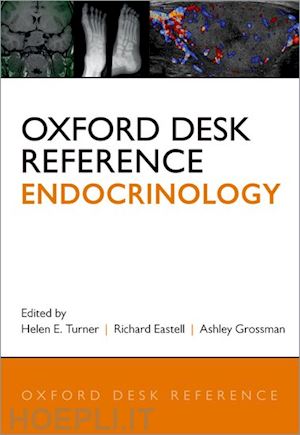Oxford Desk Reference: Endocrinology provides easy access to evidence-based materials for quick consultation but also provides an in-depth expert reference for clinical practice. It covers the process of diagnosis, investigation, and management, as well as information for patients. Internationally-renowned experts have brought together evidence, guidelines and their clinical expertise to put trustworthy support at your fingertips. The vast spectrum of endocrine disorders are clearly laid out in self-contained topics for easy reference. Chapters build bridges between pathogenesis, clinical presentation, differential diagnosis and investigation to aid understanding. Careful consideration is given to establishing a diagnosis including the recognition, investigation and management of the rarer diagnoses. The practical treatment of everyday endocrine disorders and the management of life-long conditions are outlined in clear protocols. Chapters are organised by endocrine glands, disorders and syndromes and there are sections on the involvement of hormones in other specialities including endocrine oncology. The continuity from childhood to adolescent and adult endocrinology as well as the needs of older patients is explored in specific sections. Dedicated chapters cover the important roles endocrine specialist nurses play in patient management, and dietetic advice. The editors have included a wealth of practical resources including: · A speedy reference section, which provides summaries and quick direction · A patient advice and reference section, which supports face-to-face discussion with patients · A medicolegal chapter, which outlines risk and DVLA regulations Oxford Desk Reference: Endocrinology is the ideal companion for consultants, registrars associate specialists and clinical assistants as well as those from other disciplines who share endocrine clinics including endocrine surgeons, oncologists, gynaecologists and paediatricians.











